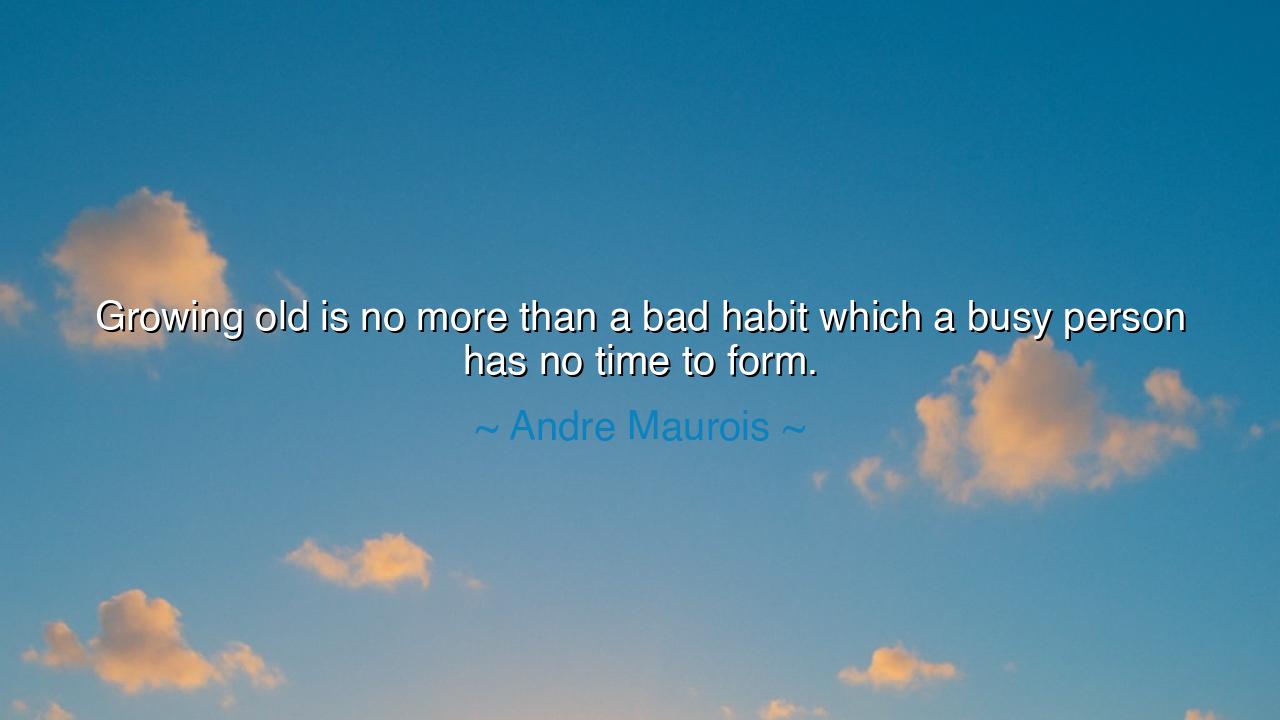
Growing old is no more than a bad habit which a busy person has






"Growing old is no more than a bad habit which a busy person has no time to form." - Andre Maurois. In this thought-provoking statement, Maurois challenges the very concept of aging as something inevitable and natural. He suggests instead that growing old is, in fact, a habit—one that is adopted as time passes, shaped by idleness, neglect, and the loss of purpose. For the busy person, whose days are filled with meaningful work, passion, and pursuit, the passage of time becomes less about the physical changes of the body and more about the energy and vibrancy that they maintain in life. Age, in this light, becomes not a reflection of years lived, but of a mindset—one that either embraces the flow of life or allows itself to be overtaken by inertia.
Consider the life of Leonardo da Vinci, a man whose mind and body remained vibrant far beyond the typical expectations for someone of his age. Da Vinci, even into his late sixties, was still at the height of his creative powers, constantly working on his studies and inventions, never allowing himself to become bogged down by the physical limitations of age. His life was filled with constant inquiry and creativity, and it is this constant engagement with the world that kept him from the "bad habit" of growing old. His brilliance did not fade because he remained forever young in spirit, driven by an unquenchable curiosity and the relentless pursuit of knowledge. Da Vinci’s life serves as a clear example of how busyness—a life filled with purpose—can keep the mind and body youthful, even in old age.
Maurois's perspective aligns with the wisdom of the ancient philosophers who taught that the secret to eternal youth was not to avoid the inevitable passing of time but to engage fully with life’s pursuits. Socrates, though growing older, never ceased to question, to teach, and to reflect on life’s mysteries. He did not grow old in the traditional sense because his mind was forever engaged in the process of learning and growth. His life was a testament to the fact that the true secret to avoiding the decay that comes with age is to continually grow, to never stop seeking, and to remain purposeful until the very end.
In this context, Maurois's quote serves as a reminder that age does not just happen to us—it is a state of mind. As we age, the world around us may change, and our bodies may begin to show the effects of time. But it is when we stop engaging with the world, when we allow routine to define our days, that we fall into the trap of growing old. Just as Socrates found joy in the philosophical dialogue that stretched across his later years, we must find purpose in every phase of life. The pursuit of knowledge, of new experiences, and of deepening relationships, should never end. If we are to avoid the habit of growing old, we must engage in life’s grand questions, challenges, and mysteries, refusing to succumb to the passivity that too often accompanies age.
This mindset is not just the domain of philosophers or artists. Take the story of Benjamin Franklin, who, even in his later years, remained deeply active in both his intellectual pursuits and his contributions to the American Revolution. Franklin did not simply rest on his laurels but remained an active participant in the shaping of his country and in scientific endeavors. His mind was perpetually engaged, whether it was with his studies of electricity or his diplomacy in Europe. Franklin’s life shows us that even in old age, busyness in the form of meaningful work and purposeful relationships can keep us vibrant and youthful in spirit.
The lesson in Maurois's words is clear: do not let age define you. To grow old is not a fate—it is a choice. If you remain busy with what truly matters, with what inspires you, then the passage of time becomes a source of growth, not decay. The key is to embrace purpose at every stage of life. Whether in the pursuit of knowledge, the development of skills, or the nurturing of relationships, stay engaged with life, for in that engagement, we preserve the youth of our spirit.
Practical advice for living in accordance with this wisdom would be to constantly seek out new challenges and opportunities for growth, no matter how old you are. Keep your mind active, be curious, and take part in the world around you with a sense of enthusiasm. Do not allow routine or comfort to lull you into the belief that the best of life is behind you. Engage in new learning, keep asking questions, and never stop exploring the possibilities that life offers. By embracing these practices, you will find that age has little power over your vitality, and the habit of growing old will have no hold on your heart or mind.






AAdministratorAdministrator
Welcome, honored guests. Please leave a comment, we will respond soon